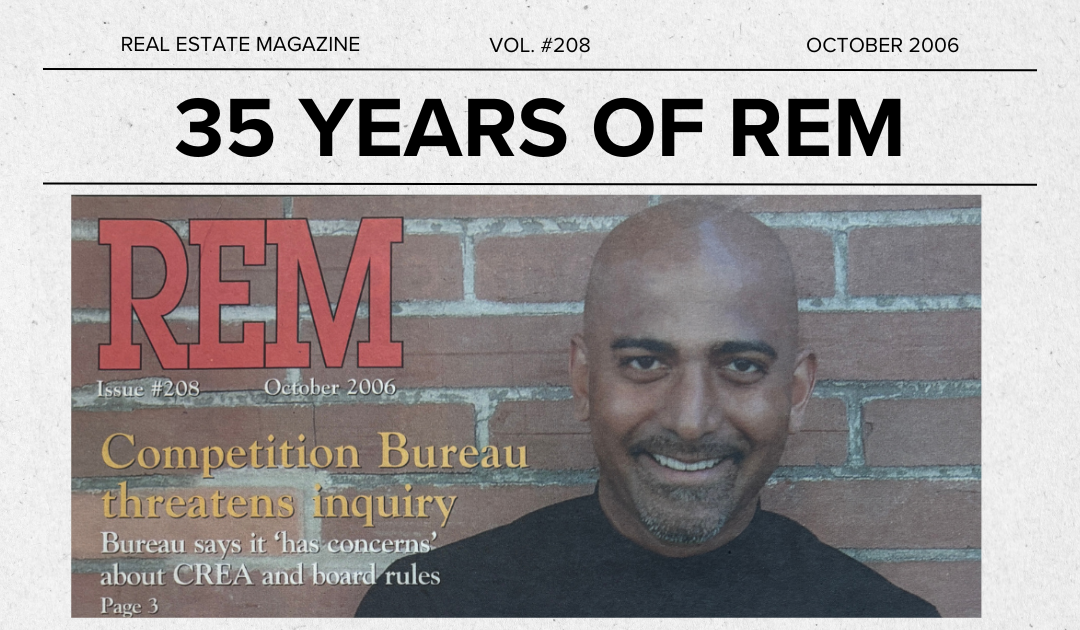To mark 35 years of Real Estate Magazine, we’re sharing articles from past issues. This article appeared in issue #208 in October 2006. Susan Doran still contributes to REM.
“Do you know what the headline for this article will be?” asks real estate broker Sunny Daljit during our interview. “It won’t be ‘The monk who sells real estate’ will it?”
I assure him that that headline is unlikely—although the truth is REM’s editor has pointedly asked me to get the lowdown on this monk business.
Daljit, who is now CEO/team leader for Keller Williams Ottawa Realty (KWOR), woke up one morning about 15 years ago to the realization that he wasn’t happy.
“I had a mid-life crisis at 24,” says Daljit, now 39.
He had gone into real estate in Ottawa against the wishes of his East Indian parents, who were eager for him to be a doctor, lawyer, or some other type of professional. (This despite the fact his mother is a Realtor herself. His retired father was a director with Agriculture Canada, which used to prompt Daljit’s mother to remark that he was an expert on the sex life of corn.)
Daljit soothed his parents’ fears by making a success of himself—in fact, becoming a top producer—in the real estate offices where he worked.
“I was living out what people said you should,” he says. But he wasn’t fulfilled. So he changed his lifestyle, became a vegetarian, and read a lot of books on spirituality.
Eventually, he took a leadership course offered by an India-based non-profit spiritual organization. Inspired, he took a three-year leave of absence from real estate and moved to India, where he trained with the organization, became a teacher, and eventually, a sannyasin, which he explains is essentially a monk.
He renounced all material wealth, selling off his property back home and donating the proceeds to charity, mainly to assist with village development in India, the chief cause of the organization he was with. He travelled from village to village, teaching and doing humanitarian work. But he began to feel there was an element of escapism to it all.
Near the end, he was in meditation in a monastery and didn’t speak for 60 days.
He felt increasingly cut off from day-to-day life. Then he read the book Jonathan Livingston Seagull and—identifying with the theme that teaching others is more beneficial than disconnecting from them—he moved back to Ottawa with hopes of finding ways to make business less soulless.
He started Centre Path, a consulting company focusing on spirit values and leadership in the workplace. “I thought if you could transform business, you could improve the world,” he says.
He got an MBA and moved to Toronto for a three-year stint as national director for a Royal LePage customer service platform before he was finally offered a job that truly fit his personal philosophy.
The life-changing phone call came in 2004 from Jeff Hooper, principal owner of the Keller Williams Ottawa office, which had opened in 2001 but was in need of some restructuring.
After looking into the company and liking what he saw, Daljit moved back to his hometown of Ottawa along with his family. He initially joined KWOR as a temporary consultant. But he wound up a partner after spearheading successful major changes that helped propel the company to its current position as one of Ottawa’s top-10 fastest-growing companies and one of the best workplaces in Canada (according to *Canadian Business* magazine). As well, the *Ottawa Business Journal* recently recognized Daljit as one of the Top 40 under 40 CEOs.
Well-known in the United States (Real Trends magazine ranks it as the fourth largest real estate company in North America), the Keller Williams franchise is not as recognized here, although the company has made remarkable strides. It now has 12 Canadian offices. When Daljit came on board, there were only two.
KWOR is the number one Keller Williams office in Canada, he says. It currently grosses more than $16-million in revenues, and has about 600 listings and 160 agents, with plans to double the number of salespeople within three years.
What Daljit immediately liked about Keller Williams was the depth of thought that has gone into its philosophy and business model.
“The fact that the company puts family and spirituality ahead of work was a main driver for me,” he says. “It’s a holistic way of thinking. There’s a sense of meaning and purpose. You’re not on a treadmill.”
That’s apparent from the fact that associates automatically have a portion of their commissions put into a charity fund. Daljit is proud to have been instrumental in ensuring that that money goes to under-funded charities that “are not on the radar screen.”
Raising the company’s profile should be a byproduct of charity work, not the goal, he says.
As it turns out, another byproduct of “making people better and more self-actualized is that they actually make more money too,” he says. He’s hopeful that the company’s innovative approaches to training, compensation, and technology, and its focus on teamwork and respect for the individual, point business in a new direction. Through a council of top producers, Realtors share in decision-making. And 50 percent of brokerage profits are also shared, via a bonus system for agents who refer new Realtors to the office.
“This gives all agents a vested interest in helping each other,” says Daljit, because the higher the company profits, the bigger the referral bonuses. The company’s compensation package is good as well.
KWOR also invests in cutting-edge technology, including an integrated messaging system that allows Realtors to have easy access to all types of communications and information. And the office itself is plush so that Realtors have an outstanding work environment. It also has an in-house mortgage service and client service network.
For Daljit, the system works.
“This is the first time I can say that my business and personal life are in balance,” he says. “We’re all making a difference in the world whatever way we feel called to.”
Susan Doran is a Toronto-based freelance writer who has been contributing to REM since its very first issue.














October 2006 Headline
It hard to believe, but I was the real estate agent who helped spark the Competition Bureau’s inquiry into CREA and board rules.